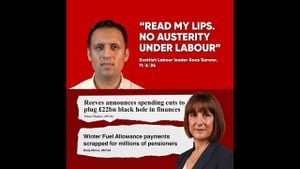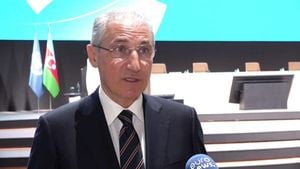At the COP29 summit, climate finance and the pressing issue of loss and damage took center stage as world leaders gathered to address the urgent matters surrounding climate change's impact on vulnerable nations. This year's conference, held in Baku, Azerbaijan, served as a pivotal platform for discussions about financial support for countries grappling with the catastrophic results of climate disasters.
South Sudan was vocal about its dire need for action, as Josephine Napwon Cosmos Ngoya, the country’s Minister of Environment and Forestry, highlighted the devastating effects of climate variability felt across her nation. The minister pointed out the tremendous challenges faced by South Sudan as over 60% of its population now suffers from food insecurity due to droughts and erratic weather patterns. “Over 3 million people have been affected by climate-related disasters, resulting in internal displacement and loss of livelihoods,” Minister Ngoya explained, calling for the establishment of the new collective quantified goal (NCQG) for climate finance.
Continuing her address, Ngoya underscored the pressing need for funding mechanisms to support countries affected by climate change, stating, “The sustainable capitalization and operationalization of the fund must be expedited to allow our affected populations to receive the support they need.” She warned of the consequences of failing to meet climate finance targets, emphasizing the necessity for urgent action with the alarming warning, “To keep the 1.5°C goal alive, urgent and decisive action is needed.”
Barbados Minister Shantal Munro-Knight also expressed her nation’s frustrations with the slow pace of progress, especially concerning the Loss and Damage Fund established last year. “I’m disappointed and frustrated, to be honest. We need USD 700 billion, and we’re not anywhere near the level of commitment required to capitalize and operationalize it,” she disclosed during her address at the summit.
At COP29, the calls for justice echoed strongly, as Greenpeace Africa moved to highlight the suffering brought by climate-related disasters across the continent. Fred Njehu of Greenpeace presented poignant reminders of this devastation by showcasing physical remnants from calamities such as the Tongaat tornado, which claimed lives and left thousands homeless. “This doll symbolizes the innocence shattered by climate chaos,” Njehu stated, addressing the emotional toll of climate disasters.
This emotional spotlight brought attention to the urgency of funding for recovery efforts, emphasizing the need for dedicated financing for climate-resilient infrastructure as many countries continue to bear the brunt of weather extremes. Dr. Lamfu Yengong, also from Greenpeace Africa, presented sobering statistics, indicating how previous climate events significantly displaced families and deteriorated local economies. “The time for delay is over. Every moment of inaction costs lives and deepens the climate injustice faced by Africa,” he insisted.
During COP29, numerous nations reiterated the importance of constructing substantial funding strategies to address these challenges, as Barbados aims to implement initiatives like debt-for-climate swaps and is exploring new financing mechanisms such as levies on the shipping and aviation sectors, which contribute significantly to emissions. Knight remarked, “If we’re serious about mitigation, we need to start taxing these large sectors and challenging them to do more.”
Looking toward sustainable solutions, climate justice advocates push for the Loss and Damage Fund to prioritize farmers, especially those from low- and middle-income countries, heavily reliant on agriculture for their livelihoods. The fund aims to alleviate the disproportionate impacts of climate-induced disasters through targeted climate finance and support.
The agricultural sector has already seen staggering losses, with the World Economic Forum reporting $3.8 trillion worth of crops and livestock lost over the past 30 years due to natural disasters. Notably, the effects of climate change are sharply felt, where adverse conditions have been linked to rising food insecurity, health issues, and water scarcity within rural communities.
“Things are not moving as quickly as we need on the mitigation front. That means adaptation becomes more expensive for us,” Knight warned, explaining how delayed actions on climate mitigation lead to rising costs for vulnerable nations struggling to adapt. With projections indicating a potential 50% decline in rice yields by the end of the century, calls for climate-smart agriculture and effective resource allocation have never been more urgent.
While the summit addressed these pressing issues, it also provided hope. Minister Ngoya pointed out South Sudan's rich natural resources, emphasizing the importance of engaging these assets for climate mitigation. She appealed for expedited resolution of negotiations on Article 6, allowing her nation to participate meaningfully in carbon trading processes. “South Sudan’s carbon sequestration capacity is unique and adaptable. We must conclude these discussions amicably at this COP,” she urged.
The consensus throughout COP29 reflects the overarching realization of shared responsibility among nations and international bodies to address climate-related damages and mobilize substantial financial resources to aid those impacted. It remains evident; as developing nations call for immediate action and support, such endeavors bridge the gap of climate injustice. To prevent current and future generations from facing the unbearable consequences, the time for change is now.
With negotiations continuing, many eyes are on the COP29 outcomes, particularly concerning how effectively commitments for the Loss and Damage Fund can be met and activated. Without significant progress on climate finance, the threats posed by climate change will carry on jeopardizing efforts and ambitions toward achieving sustainable inclusion for all nations.
There is hope, albeit guarded; yet, the responsibility lies heavily on the shoulders of wealthier nations to rise to the occasion and meet the needs of their partners tackling the climate crisis. The clarity of vision presented at COP29 will undoubtedly define its legacy and pave the way for future climate actions.



